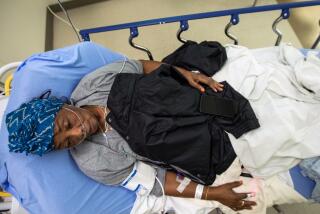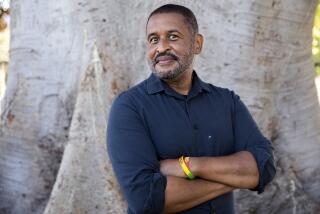Meeting Covers Blacks’ Higher Medical Risk
When members of the country’s only association of black physicians held their annual convention 25 years ago, they met in a public school because no hotel they asked would host their gathering.
This week, 3,100 predominantly well-heeled members of the National Medical Assn. are meeting in one of Los Angeles’ premier hotels. And the experts who are addressing that membership on subjects ranging from AIDS treatment to cancer technology are black.
But while black physicians have advanced from the days when they were not accepted as members of the American Medical Assn., leaders of the organization say that when it comes to battling the medical crisis among blacks, they are treading water. Black Americans remain among the highest-risk groups for cancer, AIDS, hypertension, diabetes and a host of other ills.
‘Definitely in Crisis’
“We are concerned and we are most definitely in crisis,” NMA President Dr. John Joyner, an Indianapolis neurosurgeon, told the membership. “The same diseases that were killing blacks in disproportionate numbers 10 years ago are still killing us today.”
At the 93rd national conference of the association, which began Saturday in the Westin Bonaventure and continues through the week, some of its more than 16,000 members shared information on what is killing people in their communities. According to experts at the convention, aggravating medical problems among blacks are two overriding factors: ignorance and poverty.
Studies presented at the convention underlined those factors again and again:
* Two-thirds of black males under the age of 50 suffer from hypertension, according to an NMA report. And half of black males with hypertension stop taking their medication within the first year of treatment.
* The cancer death rate is 25% higher among black Americans than among whites, Claudia Baquet of the Washington-based National Cancer Institute said. And blacks suffer disproportionately from oral, esophagus and lung cancer, which are all associated with smoking.
* While blacks make up only 12% of the American population, more than 25% of those who have tested positive for the virus that causes acquired immune deficiency syndrome are black, Joyner said. Of children born with AIDS, he said, 80% are black.
Fighting on All Fronts
“We don’t need the data to tell us how big the problem is,” said Dr. Reed Tuckson, the Washington, D.C., health commissioner who heads the group’s legislative committee. “We know that it’s in our communities. We know that we have to do something. The fight against AIDS is the same fight against drug abuse. It’s the same fight against illiteracy, it’s the same fight against poverty. We should not be confused. We must fight the battle on all these different fronts.”
But NMA leaders say they don’t have the manpower to win the fight. Despite the high prevalence of medical problems in the black community, less than 5% of medical school graduates today are black, Joyner said. Blacks are poorly represented among medical school professors and among medical residents and interns. And black physicians say the medical establishment has not done enough to address black medical ills.
The NMA, they say, is different. In November, 1987, more than 200 member physicians traveled to Tunica, Miss.--one of the most impoverished municipalities in the country--and set up a health screening center in a high school cafeteria. The operation was organized by the association, but the physicians paid their own expenses and volunteered their time.
“Many of those people,” Joyner said, “had never seen a physician before.”
As a result of a report prepared by the NMA that quantified the health problems plaguing Tunica minorities, the U.S. Public Health Service this month assigned three physicians to set up a clinic there.
Since then, the NMA has sponsored similar screening clinics in rural Louisiana and has plans to expand its program into inner-city areas this year, Joyner said.
“Blacks need to be tested by doctors they trust, or they are less likely to participate in studies and medical trials, they are less likely to ask a doctor for help, and they are less likely to benefit,” said Dr. Virginia Caine of the Marion County Health Department in Indiana. “Right now these people feel they’re being used as guinea pigs. Right now they are not taking care of themselves.”
More to Read
Sign up for Essential California
The most important California stories and recommendations in your inbox every morning.
You may occasionally receive promotional content from the Los Angeles Times.










